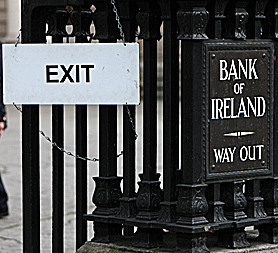Ireland: bank sector shake up as bailout bill hits £61bn
Ireland’s Central Bank revealed a £61bn black hole in its banking system today, as the government announced radical restructuring plans for the sector in a desperate attempt to calm nervous markets.

The final bill will now stand at 70bn euros (£61bn) for bailing out Ireland’s banks, Central Bank governor Patrick Honohan said, after tests revealed a further 24bn euros is needed to prop up the country’s banks.
Allied Irish Bank (AIB) needs 13.3bn euro (£11.7bn) while Bank of Ireland needs 5.2 bn euro (£4.6 bn) in further recapitalisation. Building society EBS requires 1.5bn euro (£1.3bn) while Irish Life and Permanent needs another 4bn euro (£3.5bn), he announced.
In a final “big bang” bill setting out an overhaul of the banking sector, Finance Minister Michael Noonan announced that the Government would reduce the number of domestic banks to two new “universal pillar banks”.
He revealed plans to merge two of the country’s biggest lenders – folding EBS into Allied Irish Banks.
Meanwhile, the Bank of Ireland will form the first pillar of the new banking system but will be forced to sell off 30 bn euro (£26.4 bn) of assets by 2013.
The insurance arm of Irish Life and Permanent is set to be sold, and the government plans to create special vehicles to take 80bn euros off the balance sheets of the four main lenders.
Speaking ahead of Central Bank’s announcement, Mike Aynsley, chief executive for the now state-controlled Anglo Irish Bank, said: “What I hope is this will draw a line under the uncertainty and increase confidence in bank balance sheets and specify a robust level of capital requirement. That’s a good start.”
The Central Bank said it wanted to put Irish banks in a position where they can fund themselves and generate cash without having to call on citizens to cover the bill.
The 70 bn euro bill includes 46bn euro (£40.4bn) already promised since the bank guarantee scheme was devised late one night in September 2008.
Earlier today, Anglo Irish Bank announced the worst losses on record in Irish corporate history – unveiling a shortfall of £15.5bn (17.7bn euros) for the last financial year. The bank has taken 29 bn euros of capital support in the past two years.
The European Union and the International Monetary Fund last year provided Ireland with an 85m euro bailout, but the move has failed to lift Ireland out of the doldrums.
The European Central Bank was due to extend a medium-term funding lifeline today, however it emerged earlier that the crucial plan has been delayed.
The full extent of Ireland’s bank debt was revealed to a shocked public last October, prompting the slow downfall of Brian Cowen’s government.